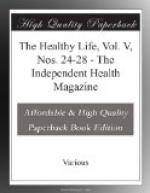2. Each Essay,
Short Story, or Sketch must be written (or typed)
on one side of the paper
only, leaving at least one inch of
margin on which each
100 words must be indicated in figures.
3. Each attempt must be accompanied by the front cover (or top part of cover showing date) of either the December or January numbers. (Where more than one MS. is sent in by one contributor, extra covers in proportion must be enclosed.)
4. The full name
and address of the competitor must be written at
the foot of last page,
in addition to the competitor’s nom de
plume (if any).
5. All Essays,
Short Stories or Sketches must be sent in not
later than the 31st
of January 1914, addressed Buried Talent,
The Healthy Life,
3 Tudor Street, London, E.C.
6. No one who is
at present, or has ever been, a regular
contributor to The
Healthy Life is eligible for a prize.
7. The Editors
reserve the right to publish any contribution sent
in under this Competition.
8. The decision
of the Editors will be final and no
correspondence can be
entered into with unsuccessful competitors.
Competitors are asked to note that legibility
of handwriting will
carry weight as well as intrinsic merit.
HEALTHY LIFE RECIPES.
SOUPS.
Many cases of ill-health demand that the meals
should be as dry as
possible. Having granted this, it will
be admitted that there is quite
a proper place for soups in ordinary everyday
food reform catering.
The chief objection to ordinary soups is that they are made on a basis of meat stock and flavoured with one of various “meat extract” preparations. Meat stock, meat gravy and meat extract all alike represent the least desirable elements in flesh food, namely, the acids and tissue-wastes of the living animal at the moment of its death—acids and tissue-debris which were on their way to normal excretion via the lymph channels, veins, etc.
It is therefore only common-sense to avoid such
soup-bases,
especially as the most excellent soups can be
made without recourse to
any animal product.
The juices of vegetables, being rich in alkaline “salts” and other organic elements, are the natural cleansing agents in a rational diet. Hence to obtain a maximum remedial effect, vegetable soup should be taken in the form of a clear, unflavoured broth, quite apart from the solid meals, and preferably on retiring. But for the dinner or supper soup, some richness of flavour and creaminess of substance are pleasing and legitimate.
The following recipes explain, first, how to prepare vegetable “stock,” and then how to make rich, creamy nourishing soups, on the basis of that “stock.” Each recipe will, of course, suggest variations.
HOW TO MAKE VEGETABLE STOCK.




